专题05 形容词、副词 2025年中考二轮语法专项复习讲义【含答案解析】
文档属性
| 名称 | 专题05 形容词、副词 2025年中考二轮语法专项复习讲义【含答案解析】 |
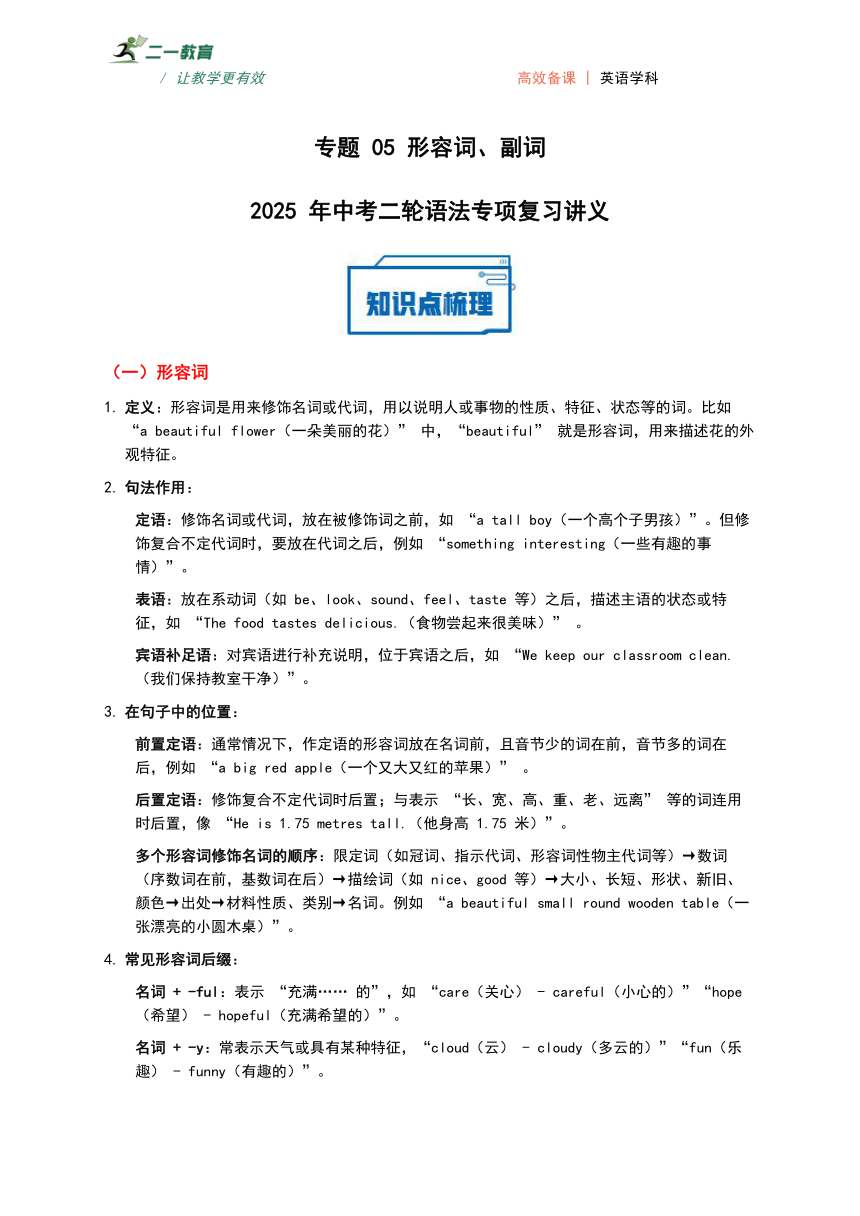
|
|
| 格式 | docx | ||
| 文件大小 | 53.3KB | ||
| 资源类型 | 试卷 | ||
| 版本资源 | 通用版 | ||
| 科目 | 英语 | ||
| 更新时间 | 2025-03-02 00:00:00 | ||
图片预览

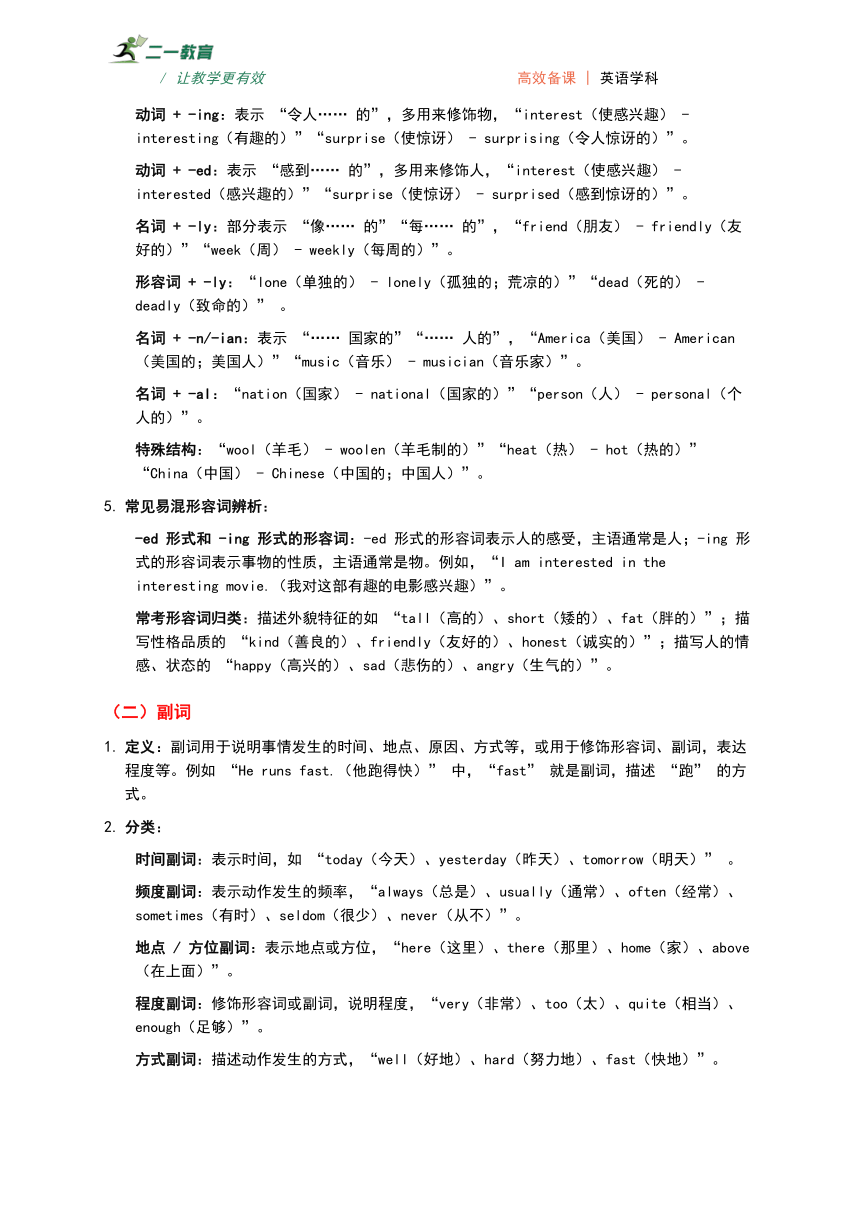
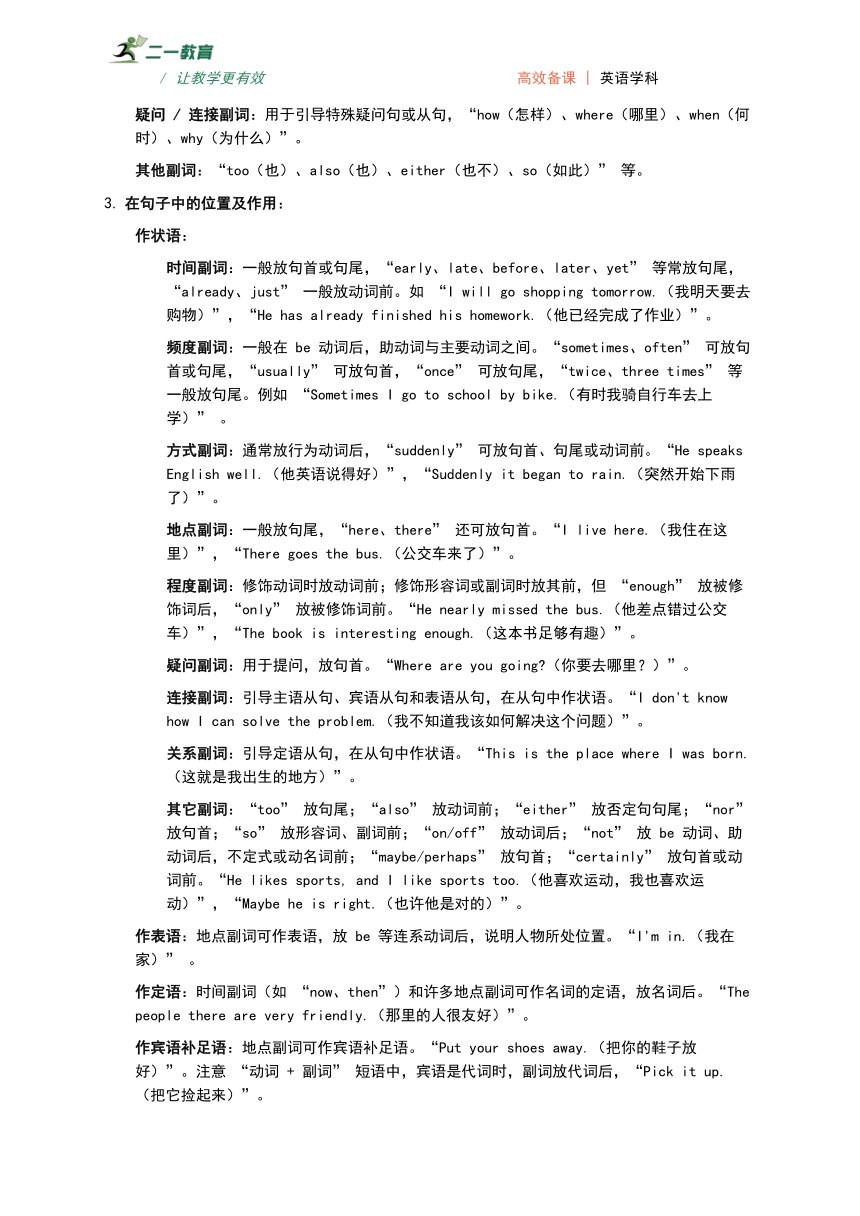
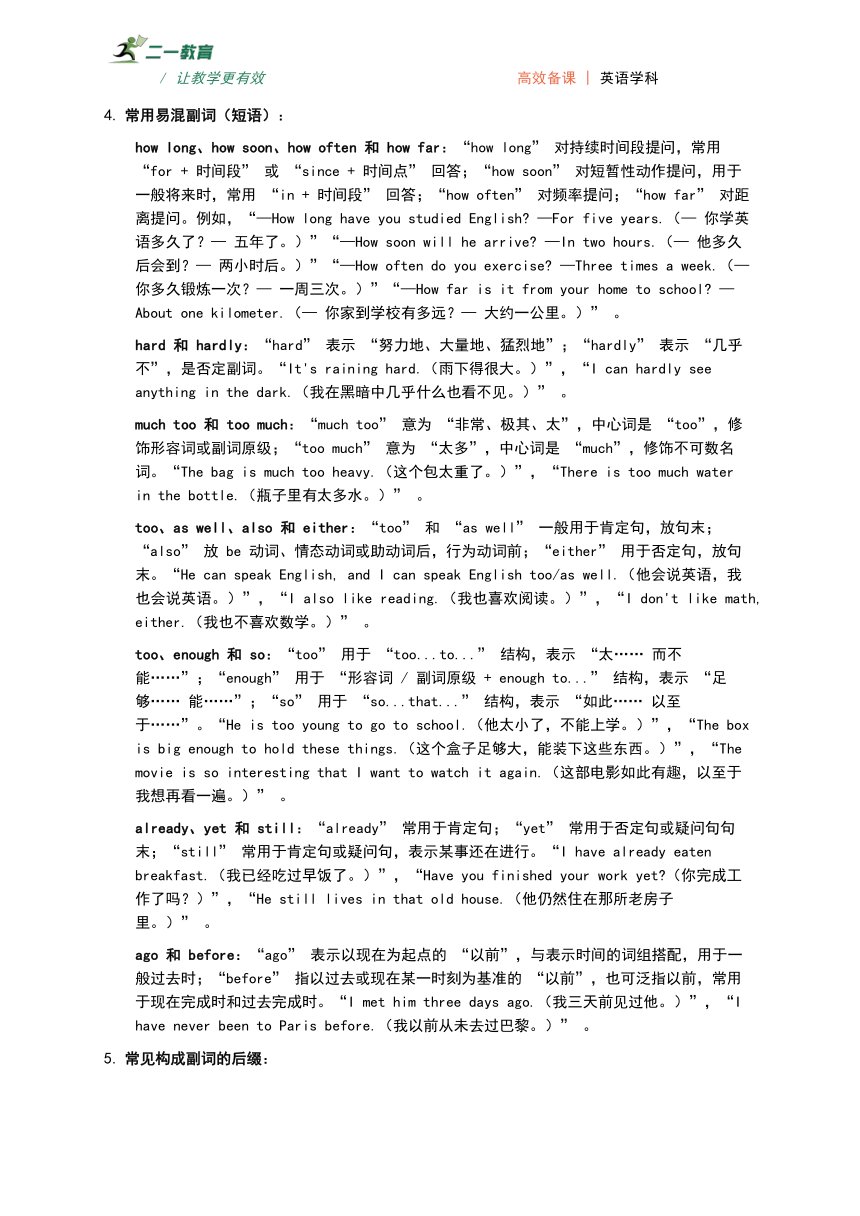
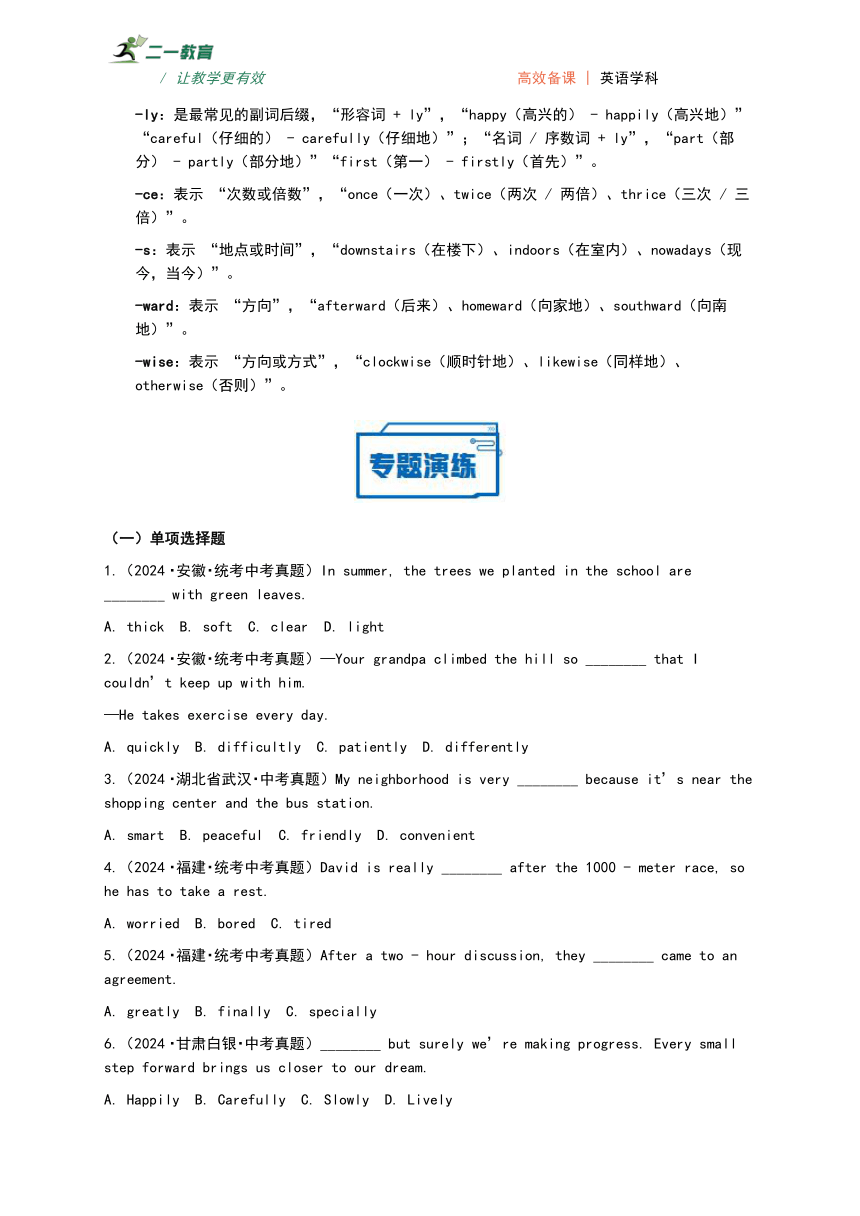
文档简介
/ 让教学更有效 高效备课 | 英语学科
专题 05 形容词、副词
2025 年中考二轮语法专项复习讲义
(一)形容词
定义:形容词是用来修饰名词或代词,用以说明人或事物的性质、特征、状态等的词。比如 “a beautiful flower(一朵美丽的花)” 中,“beautiful” 就是形容词,用来描述花的外观特征。
句法作用:
定语:修饰名词或代词,放在被修饰词之前,如 “a tall boy(一个高个子男孩)”。但修饰复合不定代词时,要放在代词之后,例如 “something interesting(一些有趣的事情)”。
表语:放在系动词(如 be、look、sound、feel、taste 等)之后,描述主语的状态或特征,如 “The food tastes delicious.(食物尝起来很美味)” 。
宾语补足语:对宾语进行补充说明,位于宾语之后,如 “We keep our classroom clean.(我们保持教室干净)”。
在句子中的位置:
前置定语:通常情况下,作定语的形容词放在名词前,且音节少的词在前,音节多的词在后,例如 “a big red apple(一个又大又红的苹果)” 。
后置定语:修饰复合不定代词时后置;与表示 “长、宽、高、重、老、远离” 等的词连用时后置,像 “He is 1.75 metres tall.(他身高 1.75 米)”。
多个形容词修饰名词的顺序:限定词(如冠词、指示代词、形容词性物主代词等)→数词(序数词在前,基数词在后)→描绘词(如 nice、good 等)→大小、长短、形状、新旧、颜色→出处→材料性质、类别→名词。例如 “a beautiful small round wooden table(一张漂亮的小圆木桌)”。
常见形容词后缀:
名词 + -ful:表示 “充满…… 的”,如 “care(关心) - careful(小心的)”“hope(希望) - hopeful(充满希望的)”。
名词 + -y:常表示天气或具有某种特征,“cloud(云) - cloudy(多云的)”“fun(乐趣) - funny(有趣的)”。
动词 + -ing:表示 “令人…… 的”,多用来修饰物,“interest(使感兴趣) - interesting(有趣的)”“surprise(使惊讶) - surprising(令人惊讶的)”。
动词 + -ed:表示 “感到…… 的”,多用来修饰人,“interest(使感兴趣) - interested(感兴趣的)”“surprise(使惊讶) - surprised(感到惊讶的)”。
名词 + -ly:部分表示 “像…… 的”“每…… 的”,“friend(朋友) - friendly(友好的)”“week(周) - weekly(每周的)”。
形容词 + -ly:“lone(单独的) - lonely(孤独的;荒凉的)”“dead(死的) - deadly(致命的)” 。
名词 + -n/-ian:表示 “…… 国家的”“…… 人的”,“America(美国) - American(美国的;美国人)”“music(音乐) - musician(音乐家)”。
名词 + -al:“nation(国家) - national(国家的)”“person(人) - personal(个人的)”。
特殊结构:“wool(羊毛) - woolen(羊毛制的)”“heat(热) - hot(热的)”“China(中国) - Chinese(中国的;中国人)”。
常见易混形容词辨析:
-ed 形式和 -ing 形式的形容词:-ed 形式的形容词表示人的感受,主语通常是人;-ing 形式的形容词表示事物的性质,主语通常是物。例如,“I am interested in the interesting movie.(我对这部有趣的电影感兴趣)”。
常考形容词归类:描述外貌特征的如 “tall(高的)、short(矮的)、fat(胖的)”;描写性格品质的 “kind(善良的)、friendly(友好的)、honest(诚实的)”;描写人的情感、状态的 “happy(高兴的)、sad(悲伤的)、angry(生气的)”。
(二)副词
定义:副词用于说明事情发生的时间、地点、原因、方式等,或用于修饰形容词、副词,表达程度等。例如 “He runs fast.(他跑得快)” 中,“fast” 就是副词,描述 “跑” 的方式。
分类:
时间副词:表示时间,如 “today(今天)、yesterday(昨天)、tomorrow(明天)” 。
频度副词:表示动作发生的频率,“always(总是)、usually(通常)、often(经常)、sometimes(有时)、seldom(很少)、never(从不)”。
地点 / 方位副词:表示地点或方位,“here(这里)、there(那里)、home(家)、above(在上面)”。
程度副词:修饰形容词或副词,说明程度,“very(非常)、too(太)、quite(相当)、enough(足够)”。
方式副词:描述动作发生的方式,“well(好地)、hard(努力地)、fast(快地)”。
疑问 / 连接副词:用于引导特殊疑问句或从句,“how(怎样)、where(哪里)、when(何时)、why(为什么)”。
其他副词:“too(也)、also(也)、either(也不)、so(如此)” 等。
在句子中的位置及作用:
作状语:
时间副词:一般放句首或句尾,“early、late、before、later、yet” 等常放句尾,“already、just” 一般放动词前。如 “I will go shopping tomorrow.(我明天要去购物)”,“He has already finished his homework.(他已经完成了作业)”。
频度副词:一般在 be 动词后,助动词与主要动词之间。“sometimes、often” 可放句首或句尾,“usually” 可放句首,“once” 可放句尾,“twice、three times” 等一般放句尾。例如 “Sometimes I go to school by bike.(有时我骑自行车去上学)” 。
方式副词:通常放行为动词后,“suddenly” 可放句首、句尾或动词前。“He speaks English well.(他英语说得好)”,“Suddenly it began to rain.(突然开始下雨了)”。
地点副词:一般放句尾,“here、there” 还可放句首。“I live here.(我住在这里)”,“There goes the bus.(公交车来了)”。
程度副词:修饰动词时放动词前;修饰形容词或副词时放其前,但 “enough” 放被修饰词后,“only” 放被修饰词前。“He nearly missed the bus.(他差点错过公交车)”,“The book is interesting enough.(这本书足够有趣)”。
疑问副词:用于提问,放句首。“Where are you going (你要去哪里?)”。
连接副词:引导主语从句、宾语从句和表语从句,在从句中作状语。“I don't know how I can solve the problem.(我不知道我该如何解决这个问题)”。
关系副词:引导定语从句,在从句中作状语。“This is the place where I was born.(这就是我出生的地方)”。
其它副词:“too” 放句尾;“also” 放动词前;“either” 放否定句句尾;“nor” 放句首;“so” 放形容词、副词前;“on/off” 放动词后;“not” 放 be 动词、助动词后,不定式或动名词前;“maybe/perhaps” 放句首;“certainly” 放句首或动词前。“He likes sports, and I like sports too.(他喜欢运动,我也喜欢运动)”,“Maybe he is right.(也许他是对的)”。
作表语:地点副词可作表语,放 be 等连系动词后,说明人物所处位置。“I'm in.(我在家)” 。
作定语:时间副词(如 “now、then”)和许多地点副词可作名词的定语,放名词后。“The people there are very friendly.(那里的人很友好)”。
作宾语补足语:地点副词可作宾语补足语。“Put your shoes away.(把你的鞋子放好)”。注意 “动词 + 副词” 短语中,宾语是代词时,副词放代词后,“Pick it up.(把它捡起来)”。
常用易混副词(短语):
how long、how soon、how often 和 how far:“how long” 对持续时间段提问,常用 “for + 时间段” 或 “since + 时间点” 回答;“how soon” 对短暂性动作提问,用于一般将来时,常用 “in + 时间段” 回答;“how often” 对频率提问;“how far” 对距离提问。例如,“—How long have you studied English —For five years.(— 你学英语多久了?— 五年了。)”“—How soon will he arrive —In two hours.(— 他多久后会到?— 两小时后。)”“—How often do you exercise —Three times a week.(— 你多久锻炼一次?— 一周三次。)”“—How far is it from your home to school —About one kilometer.(— 你家到学校有多远?— 大约一公里。)” 。
hard 和 hardly:“hard” 表示 “努力地、大量地、猛烈地”;“hardly” 表示 “几乎不”,是否定副词。“It's raining hard.(雨下得很大。)”,“I can hardly see anything in the dark.(我在黑暗中几乎什么也看不见。)” 。
much too 和 too much:“much too” 意为 “非常、极其、太”,中心词是 “too”,修饰形容词或副词原级;“too much” 意为 “太多”,中心词是 “much”,修饰不可数名词。“The bag is much too heavy.(这个包太重了。)”,“There is too much water in the bottle.(瓶子里有太多水。)” 。
too、as well、also 和 either:“too” 和 “as well” 一般用于肯定句,放句末;“also” 放 be 动词、情态动词或助动词后,行为动词前;“either” 用于否定句,放句末。“He can speak English, and I can speak English too/as well.(他会说英语,我也会说英语。)”,“I also like reading.(我也喜欢阅读。)”,“I don't like math, either.(我也不喜欢数学。)” 。
too、enough 和 so:“too” 用于 “too...to...” 结构,表示 “太…… 而不能……”;“enough” 用于 “形容词 / 副词原级 + enough to...” 结构,表示 “足够…… 能……”;“so” 用于 “so...that...” 结构,表示 “如此…… 以至于……”。“He is too young to go to school.(他太小了,不能上学。)”,“The box is big enough to hold these things.(这个盒子足够大,能装下这些东西。)”,“The movie is so interesting that I want to watch it again.(这部电影如此有趣,以至于我想再看一遍。)” 。
already、yet 和 still:“already” 常用于肯定句;“yet” 常用于否定句或疑问句句末;“still” 常用于肯定句或疑问句,表示某事还在进行。“I have already eaten breakfast.(我已经吃过早饭了。)”,“Have you finished your work yet (你完成工作了吗?)”,“He still lives in that old house.(他仍然住在那所老房子里。)” 。
ago 和 before:“ago” 表示以现在为起点的 “以前”,与表示时间的词组搭配,用于一般过去时;“before” 指以过去或现在某一时刻为基准的 “以前”,也可泛指以前,常用于现在完成时和过去完成时。“I met him three days ago.(我三天前见过他。)”,“I have never been to Paris before.(我以前从未去过巴黎。)” 。
常见构成副词的后缀:
-ly:是最常见的副词后缀,“形容词 + ly”,“happy(高兴的) - happily(高兴地)”“careful(仔细的) - carefully(仔细地)”;“名词 / 序数词 + ly”,“part(部分) - partly(部分地)”“first(第一) - firstly(首先)”。
-ce:表示 “次数或倍数”,“once(一次)、twice(两次 / 两倍)、thrice(三次 / 三倍)”。
-s:表示 “地点或时间”,“downstairs(在楼下)、indoors(在室内)、nowadays(现今,当今)”。
-ward:表示 “方向”,“afterward(后来)、homeward(向家地)、southward(向南地)”。
-wise:表示 “方向或方式”,“clockwise(顺时针地)、likewise(同样地)、otherwise(否则)”。
(一)单项选择题
1.(2024 安徽 统考中考真题)In summer, the trees we planted in the school are ________ with green leaves.
A. thick B. soft C. clear D. light
2.(2024 安徽 统考中考真题)—Your grandpa climbed the hill so ________ that I couldn’t keep up with him.
—He takes exercise every day.
A. quickly B. difficultly C. patiently D. differently
3.(2024 湖北省武汉 中考真题)My neighborhood is very ________ because it’s near the shopping center and the bus station.
A. smart B. peaceful C. friendly D. convenient
4.(2024 福建 统考中考真题)David is really ________ after the 1000 - meter race, so he has to take a rest.
A. worried B. bored C. tired
5.(2024 福建 统考中考真题)After a two - hour discussion, they ________ came to an agreement.
A. greatly B. finally C. specially
6.(2024 甘肃白银 中考真题)________ but surely we’re making progress. Every small step forward brings us closer to our dream.
A. Happily B. Carefully C. Slowly D. Lively
7.(2024 甘肃白银 中考真题)The road is very ________ after the heavy rain. Drivers are warned to drive carefully to avoid accidents.
A. empty B. dangerous C. beautiful D. dirty
8.(2024 甘肃省临夏州 中考真题)—Lisa, would you like to come to my birthday party next Saturday
—I’d love to, but I’m not ________. I’m busy preparing for the test.
A. available B. enjoyable C. believable D. comfortable
9.(2024 江苏省连云港市 中考真题)UNICEF helps build a better world for everyone, _________ children all over the world.
A. probably B. luckily C. especially D. closely
10.(2024 甘肃省临夏州 中考真题) Science and technology are developing ________ in our country.
A. directly B. quickly C. seriously D. silently
(二)填空题
1.(2024 云南 中考真题)It's very ________(noise) outside. Please close the window.
2.(2024 四川 中考真题)The little girl looked at the big cake ________(happy). She couldn't wait to eat it.
3.(2024 山东 中考真题)December is the ________(twelve) month of a year.
4.(2024 重庆 中考真题)We should listen to the teacher ________(careful) in class.
5.(2023 湖南 中考真题)The ________(leaf) on the trees turn yellow in autumn.
6.(2023 浙江 中考真题)It's ________(sun) today. Let's go for a picnic.
7.(2022 湖北 中考真题)There are some ________(tomato) and eggs in the fridge.
8.(2024 江西 中考真题)He runs ________(fast) than his brother.
9.(2024 贵州 中考真题)The ________(good) way to relax is through exercise.
10.(2024 广西 中考真题)My mother is a ________(kindness) woman. She always helps others.
(三)完形填空
(2023 河南 中考真题)
I have a good friend. Her name is Mary. She is 1 years old. She is from 2. She has big eyes and long 3 hair. She is 4 and always ready to help others.
Mary likes 5 very much. She can play the piano and the guitar. She often plays the piano in the 6. She also likes reading. She reads a lot of 7 books. She often goes to the library 8 weekends.
Mary is 9 good at sports. She can run fast and jump high. She often plays 10 with her classmates after school.
A. thirteen B. thirteenth C. the thirteen D. the thirteenth
A. American B. America C. Chinese D. China
A. curly B. curlier C. curliest D. more curly
A. kind B. kinder C. kindest D. the kindest
A. music B. art C. sports D. science
A. morning B. afternoon C. evening D. night
A. interest B. interested C. interesting D. interests
A. in B. on C. at D. by
A. too B. also C. either D. as well
A. basketball B. the basketball C. a basketball D. an basketball
(四)阅读理解
第一篇
(2024 广东 中考真题)
My name is Tom. I'm a middle school student. I have a busy but happy life.
I usually get up at 6:30 in the morning. After getting up, I wash my face and brush my teeth quickly. Then I have breakfast with my parents. I go to school by bike at 7:30. School starts at 8:00. We have four classes in the morning and three classes in the afternoon. My favorite subject is math. I think it's difficult but interesting.
After school, I often play basketball with my classmates. It's my favorite sport. Sometimes, I go to the library to read books. I like reading very much.
I get home at 5:30. After dinner, I do my homework first. Then I watch TV for a while. I go to bed at 9:30.
What time does Tom usually get up
A. At 6:00. B. At 6:30. C. At 7:00. D. At 7:30.
How does Tom go to school
A. On foot. B. By bus. C. By bike. D. By car.
How many classes does Tom have in a day
A. Four. B. Five. C. Six. D. Seven.
What's Tom's favorite subject
A. English. B. Math. C. Chinese. D. History.
What does Tom often do after school
A. Play basketball. B. Play football. C. Go to the library. D. Watch TV.
第二篇
(2023 江苏 中考真题)
Dear Lucy,
I'm glad to be your pen pal. My name is Li Hua. I'm from China. I'm 13 years old. I live in Beijing with my parents.
I have many hobbies. I like singing and dancing. I can sing many English songs. I also like drawing pictures. My favorite subject is art. I think it's very interesting.
On weekends, I often go to the park with my parents. We fly kites and have a picnic there. Sometimes, I go to the zoo with my friends. I like animals very much.
I hope we can write to each other often.
Best wishes!
Li Hua
Where is Li Hua from
A. America. B. England. C. China. D. Japan.
How old is Li Hua
A. 12. B. 13. C. 14. D. 15.
What are Li Hua's hobbies
A. Singing and dancing. B. Drawing pictures.
C. Singing, dancing and drawing pictures. D. Flying kites and having a picnic.
What's Li Hua's favorite subject
A. Math. B. English. C. Art. D. Music.
What does Li Hua often do on weekends
A. Go to the park. B. Go to the zoo.
C. Go to the library. D. Both A and B.
第三篇
(2022 四川 中考真题)
I have a pet dog. Its name is Coco. It's very cute. Coco is two years old. It has white fur and big eyes. It likes to play with balls. Every day, I take it for a walk in the park after dinner. Coco is very friendly to people. It never bites anyone.
One day, I lost Coco. I was very worried. I looked for it everywhere. Finally, I found it in the park. I was so happy.
Coco is not only my pet but also my good friend. I love it very much.
How old is Coco
A. One year old. B. Two years old. C. Three years old. D. Four years old.
What color is Coco's fur
A. Black. B. Brown. C. White. D. Yellow.
What does Coco like to play with
A. Toys. B. Balls. C. Cards. D. Books.
When does the writer take Coco for a walk
A. Before breakfast. B. After breakfast. C. Before dinner. D. After dinner.
Why was the writer worried
A. Because Coco was ill. B. Because Coco was lost.
C. Because Coco bit someone. D. Because Coco didn't like to play with balls.
参考答案
(一)单项选择
1 - 5 BCACB;6 - 10 CCABA
(二)填空题
1.yourself;2. How long;3. When;4. yours;5. anybody;6. my; myself;7. butterflies;8. sheep;9. twelfth;10. How heavy
(三)完形填空
1 - 5 ACADC;6 - 6 B
(四)阅读理解
第一篇:1 - 5 CBCCC
第二篇:1 - 5 CBACA
第三篇:1 - 5 BCBCB
【解析】
(一)单项选择
第 1 题:help 是动词,后接人称代词宾格,we 是主格,our 是形容词性物主代词,us 是宾格,所以选 B。
第 2 题:根据 “Mark just phoned to say he’d left his coat behind” 可知这里是问这件外套是他的吗,his 是名词性物主代词,意为 “他的”,所以选 C。
第 3 题:根据问句 “who are the girls over there” 可知回答用 they 指代 the girls,所以选 A。
第 4 题:根据问句 “is this your sister’s smartwatch” 可知回答是说她的(姐姐的)是粉色的,hers 是名词性物主代词,意为 “她的”,所以选 C。
第 5 题:Chinese 在这里是 “中文”,不可数名词,a few 修饰可数名词复数,a little 修饰不可数名词,little 表示 “几乎没有”,由 “Tom has been in Shanghai for five years” 可知他能说一点中文,所以选 B。
第 6 题:根据 “Is it Mary’s” 以及 “Yes” 可知回答是说它是她的,hers 是名词性物主代词,意为 “她的”,所以选 C。
第 7 题:根据 “Xiangsheng and Xiaopin” 可知是两者,all 指三者或三者以上都,none 指三者或三者以上都不,both 指两者都,neither 指两者都不,这里说两者都能让人开怀大笑,所以选 C。
第 8 题:something 用于肯定句,anything 用于疑问句和否定句,形容词修饰复合不定代词要后置,所以选 A。
第 9 题:根据 “The best things in life are free” 以及 “but we can’t live without it” 可知空气不花钱,nothing 表示 “没有什么”,所以选 B。
第 10 题:这里用 it 作形式宾语,真正的宾语是后面的 “to read English magazines for English learning”,所以选 A。
(二)填空题
第 1 题:believe in oneself 表示 “相信自己”,这里是对 Maria 说的,所以用 yourself。
第 2 题:根据回答 “For 7 years” 可知问的是多长时间,用 How long。
第 3 题:根据回答 “In 1893” 可知问的是时间,用 When。
第 4 题:根据回答 “No, it’s not mine” 可知问的是这是你的(书)吗,yours 是名词性物主代词,意为 “你的”。
第 5 题:这是一个一般疑问句,用 anybody 表示 “任何人”。
第 6 题:第一个空用形容词性物主代词 my 修饰 parents,第二个空用反身代词 myself ,look after oneself 表示 “照顾自己”。
第 7 题:many 修饰可数名词复数,butterfly 的复数是 butterflies。
第 8 题:sheep 单复数同形,所以这里还是用 sheep。
第 9 题:表示 “第十二” 用序数词 twelfth。
第 10 题:根据回答 “it weighs about 181,000 kilos” 可知问的是多重,用 How heavy。
(三)完形填空
第 1 题:help each other 表示 “互相帮助”,所以选 A。
第 2 题:homes 是名词,前面用形容词性物主代词 our 修饰,所以选 C。
第 3 题:这里用 it 指代前面提到的 my favorite book,所以选 A。
第 4 题:还是指代那本书,用 it,所以选 D。
第 5 题:be angry with sb. 表示 “生某人的气”,所以选 C。
第 6 题:根据语境可知她没问我就想借,without 表示 “没有”,所以选 B。
(四)阅读理解
第一篇
第 1 题:根据 “There are six people in my family” 可知选 C。
第 2 题:根据 “My father is a doctor” 可知选 B。
第 3 题:根据 “My mother is a teacher. She teaches English in a middle school” 可知选 C。
第 4 题:根据 “We also have a pet dog. Its name is Coco” 可知选 C。
第 5 题:根据 “On weekends, my family often go to the park. We fly kites and have a picnic there” 可知选 C。
第二篇
第 1 题:根据 “The most common one is body language” 可知选 C。
第 2 题:根据 “When we are happy, we smile” 可知选 B。
第 3 题:根据 “Body language is very important in our lives. It can help us communicate better” 可知选 A。
第 4 题:根据 “In some countries, people kiss each other when they meet” 可知选 C。
第 5 题:根据 “So when we go to a new country, we should learn about its body language” 可知选 A。
第三篇
第 1 题:根据 “He is 13 years old” 可知选 B。
第 2 题:根据 “He often goes to the library after school” 可知选 C。
第 3 题:根据 “Li Ming has a pet cat. Its name is Mimi” 可知选 B。
第 4 题:根据 “Li Ming's favorite subject is English” 可知选 C。
第 5 题:根据 “He wants to be an English teacher when he grows up” 可知选 B。
专题 05 形容词、副词
2025 年中考二轮语法专项复习讲义
(一)形容词
定义:形容词是用来修饰名词或代词,用以说明人或事物的性质、特征、状态等的词。比如 “a beautiful flower(一朵美丽的花)” 中,“beautiful” 就是形容词,用来描述花的外观特征。
句法作用:
定语:修饰名词或代词,放在被修饰词之前,如 “a tall boy(一个高个子男孩)”。但修饰复合不定代词时,要放在代词之后,例如 “something interesting(一些有趣的事情)”。
表语:放在系动词(如 be、look、sound、feel、taste 等)之后,描述主语的状态或特征,如 “The food tastes delicious.(食物尝起来很美味)” 。
宾语补足语:对宾语进行补充说明,位于宾语之后,如 “We keep our classroom clean.(我们保持教室干净)”。
在句子中的位置:
前置定语:通常情况下,作定语的形容词放在名词前,且音节少的词在前,音节多的词在后,例如 “a big red apple(一个又大又红的苹果)” 。
后置定语:修饰复合不定代词时后置;与表示 “长、宽、高、重、老、远离” 等的词连用时后置,像 “He is 1.75 metres tall.(他身高 1.75 米)”。
多个形容词修饰名词的顺序:限定词(如冠词、指示代词、形容词性物主代词等)→数词(序数词在前,基数词在后)→描绘词(如 nice、good 等)→大小、长短、形状、新旧、颜色→出处→材料性质、类别→名词。例如 “a beautiful small round wooden table(一张漂亮的小圆木桌)”。
常见形容词后缀:
名词 + -ful:表示 “充满…… 的”,如 “care(关心) - careful(小心的)”“hope(希望) - hopeful(充满希望的)”。
名词 + -y:常表示天气或具有某种特征,“cloud(云) - cloudy(多云的)”“fun(乐趣) - funny(有趣的)”。
动词 + -ing:表示 “令人…… 的”,多用来修饰物,“interest(使感兴趣) - interesting(有趣的)”“surprise(使惊讶) - surprising(令人惊讶的)”。
动词 + -ed:表示 “感到…… 的”,多用来修饰人,“interest(使感兴趣) - interested(感兴趣的)”“surprise(使惊讶) - surprised(感到惊讶的)”。
名词 + -ly:部分表示 “像…… 的”“每…… 的”,“friend(朋友) - friendly(友好的)”“week(周) - weekly(每周的)”。
形容词 + -ly:“lone(单独的) - lonely(孤独的;荒凉的)”“dead(死的) - deadly(致命的)” 。
名词 + -n/-ian:表示 “…… 国家的”“…… 人的”,“America(美国) - American(美国的;美国人)”“music(音乐) - musician(音乐家)”。
名词 + -al:“nation(国家) - national(国家的)”“person(人) - personal(个人的)”。
特殊结构:“wool(羊毛) - woolen(羊毛制的)”“heat(热) - hot(热的)”“China(中国) - Chinese(中国的;中国人)”。
常见易混形容词辨析:
-ed 形式和 -ing 形式的形容词:-ed 形式的形容词表示人的感受,主语通常是人;-ing 形式的形容词表示事物的性质,主语通常是物。例如,“I am interested in the interesting movie.(我对这部有趣的电影感兴趣)”。
常考形容词归类:描述外貌特征的如 “tall(高的)、short(矮的)、fat(胖的)”;描写性格品质的 “kind(善良的)、friendly(友好的)、honest(诚实的)”;描写人的情感、状态的 “happy(高兴的)、sad(悲伤的)、angry(生气的)”。
(二)副词
定义:副词用于说明事情发生的时间、地点、原因、方式等,或用于修饰形容词、副词,表达程度等。例如 “He runs fast.(他跑得快)” 中,“fast” 就是副词,描述 “跑” 的方式。
分类:
时间副词:表示时间,如 “today(今天)、yesterday(昨天)、tomorrow(明天)” 。
频度副词:表示动作发生的频率,“always(总是)、usually(通常)、often(经常)、sometimes(有时)、seldom(很少)、never(从不)”。
地点 / 方位副词:表示地点或方位,“here(这里)、there(那里)、home(家)、above(在上面)”。
程度副词:修饰形容词或副词,说明程度,“very(非常)、too(太)、quite(相当)、enough(足够)”。
方式副词:描述动作发生的方式,“well(好地)、hard(努力地)、fast(快地)”。
疑问 / 连接副词:用于引导特殊疑问句或从句,“how(怎样)、where(哪里)、when(何时)、why(为什么)”。
其他副词:“too(也)、also(也)、either(也不)、so(如此)” 等。
在句子中的位置及作用:
作状语:
时间副词:一般放句首或句尾,“early、late、before、later、yet” 等常放句尾,“already、just” 一般放动词前。如 “I will go shopping tomorrow.(我明天要去购物)”,“He has already finished his homework.(他已经完成了作业)”。
频度副词:一般在 be 动词后,助动词与主要动词之间。“sometimes、often” 可放句首或句尾,“usually” 可放句首,“once” 可放句尾,“twice、three times” 等一般放句尾。例如 “Sometimes I go to school by bike.(有时我骑自行车去上学)” 。
方式副词:通常放行为动词后,“suddenly” 可放句首、句尾或动词前。“He speaks English well.(他英语说得好)”,“Suddenly it began to rain.(突然开始下雨了)”。
地点副词:一般放句尾,“here、there” 还可放句首。“I live here.(我住在这里)”,“There goes the bus.(公交车来了)”。
程度副词:修饰动词时放动词前;修饰形容词或副词时放其前,但 “enough” 放被修饰词后,“only” 放被修饰词前。“He nearly missed the bus.(他差点错过公交车)”,“The book is interesting enough.(这本书足够有趣)”。
疑问副词:用于提问,放句首。“Where are you going (你要去哪里?)”。
连接副词:引导主语从句、宾语从句和表语从句,在从句中作状语。“I don't know how I can solve the problem.(我不知道我该如何解决这个问题)”。
关系副词:引导定语从句,在从句中作状语。“This is the place where I was born.(这就是我出生的地方)”。
其它副词:“too” 放句尾;“also” 放动词前;“either” 放否定句句尾;“nor” 放句首;“so” 放形容词、副词前;“on/off” 放动词后;“not” 放 be 动词、助动词后,不定式或动名词前;“maybe/perhaps” 放句首;“certainly” 放句首或动词前。“He likes sports, and I like sports too.(他喜欢运动,我也喜欢运动)”,“Maybe he is right.(也许他是对的)”。
作表语:地点副词可作表语,放 be 等连系动词后,说明人物所处位置。“I'm in.(我在家)” 。
作定语:时间副词(如 “now、then”)和许多地点副词可作名词的定语,放名词后。“The people there are very friendly.(那里的人很友好)”。
作宾语补足语:地点副词可作宾语补足语。“Put your shoes away.(把你的鞋子放好)”。注意 “动词 + 副词” 短语中,宾语是代词时,副词放代词后,“Pick it up.(把它捡起来)”。
常用易混副词(短语):
how long、how soon、how often 和 how far:“how long” 对持续时间段提问,常用 “for + 时间段” 或 “since + 时间点” 回答;“how soon” 对短暂性动作提问,用于一般将来时,常用 “in + 时间段” 回答;“how often” 对频率提问;“how far” 对距离提问。例如,“—How long have you studied English —For five years.(— 你学英语多久了?— 五年了。)”“—How soon will he arrive —In two hours.(— 他多久后会到?— 两小时后。)”“—How often do you exercise —Three times a week.(— 你多久锻炼一次?— 一周三次。)”“—How far is it from your home to school —About one kilometer.(— 你家到学校有多远?— 大约一公里。)” 。
hard 和 hardly:“hard” 表示 “努力地、大量地、猛烈地”;“hardly” 表示 “几乎不”,是否定副词。“It's raining hard.(雨下得很大。)”,“I can hardly see anything in the dark.(我在黑暗中几乎什么也看不见。)” 。
much too 和 too much:“much too” 意为 “非常、极其、太”,中心词是 “too”,修饰形容词或副词原级;“too much” 意为 “太多”,中心词是 “much”,修饰不可数名词。“The bag is much too heavy.(这个包太重了。)”,“There is too much water in the bottle.(瓶子里有太多水。)” 。
too、as well、also 和 either:“too” 和 “as well” 一般用于肯定句,放句末;“also” 放 be 动词、情态动词或助动词后,行为动词前;“either” 用于否定句,放句末。“He can speak English, and I can speak English too/as well.(他会说英语,我也会说英语。)”,“I also like reading.(我也喜欢阅读。)”,“I don't like math, either.(我也不喜欢数学。)” 。
too、enough 和 so:“too” 用于 “too...to...” 结构,表示 “太…… 而不能……”;“enough” 用于 “形容词 / 副词原级 + enough to...” 结构,表示 “足够…… 能……”;“so” 用于 “so...that...” 结构,表示 “如此…… 以至于……”。“He is too young to go to school.(他太小了,不能上学。)”,“The box is big enough to hold these things.(这个盒子足够大,能装下这些东西。)”,“The movie is so interesting that I want to watch it again.(这部电影如此有趣,以至于我想再看一遍。)” 。
already、yet 和 still:“already” 常用于肯定句;“yet” 常用于否定句或疑问句句末;“still” 常用于肯定句或疑问句,表示某事还在进行。“I have already eaten breakfast.(我已经吃过早饭了。)”,“Have you finished your work yet (你完成工作了吗?)”,“He still lives in that old house.(他仍然住在那所老房子里。)” 。
ago 和 before:“ago” 表示以现在为起点的 “以前”,与表示时间的词组搭配,用于一般过去时;“before” 指以过去或现在某一时刻为基准的 “以前”,也可泛指以前,常用于现在完成时和过去完成时。“I met him three days ago.(我三天前见过他。)”,“I have never been to Paris before.(我以前从未去过巴黎。)” 。
常见构成副词的后缀:
-ly:是最常见的副词后缀,“形容词 + ly”,“happy(高兴的) - happily(高兴地)”“careful(仔细的) - carefully(仔细地)”;“名词 / 序数词 + ly”,“part(部分) - partly(部分地)”“first(第一) - firstly(首先)”。
-ce:表示 “次数或倍数”,“once(一次)、twice(两次 / 两倍)、thrice(三次 / 三倍)”。
-s:表示 “地点或时间”,“downstairs(在楼下)、indoors(在室内)、nowadays(现今,当今)”。
-ward:表示 “方向”,“afterward(后来)、homeward(向家地)、southward(向南地)”。
-wise:表示 “方向或方式”,“clockwise(顺时针地)、likewise(同样地)、otherwise(否则)”。
(一)单项选择题
1.(2024 安徽 统考中考真题)In summer, the trees we planted in the school are ________ with green leaves.
A. thick B. soft C. clear D. light
2.(2024 安徽 统考中考真题)—Your grandpa climbed the hill so ________ that I couldn’t keep up with him.
—He takes exercise every day.
A. quickly B. difficultly C. patiently D. differently
3.(2024 湖北省武汉 中考真题)My neighborhood is very ________ because it’s near the shopping center and the bus station.
A. smart B. peaceful C. friendly D. convenient
4.(2024 福建 统考中考真题)David is really ________ after the 1000 - meter race, so he has to take a rest.
A. worried B. bored C. tired
5.(2024 福建 统考中考真题)After a two - hour discussion, they ________ came to an agreement.
A. greatly B. finally C. specially
6.(2024 甘肃白银 中考真题)________ but surely we’re making progress. Every small step forward brings us closer to our dream.
A. Happily B. Carefully C. Slowly D. Lively
7.(2024 甘肃白银 中考真题)The road is very ________ after the heavy rain. Drivers are warned to drive carefully to avoid accidents.
A. empty B. dangerous C. beautiful D. dirty
8.(2024 甘肃省临夏州 中考真题)—Lisa, would you like to come to my birthday party next Saturday
—I’d love to, but I’m not ________. I’m busy preparing for the test.
A. available B. enjoyable C. believable D. comfortable
9.(2024 江苏省连云港市 中考真题)UNICEF helps build a better world for everyone, _________ children all over the world.
A. probably B. luckily C. especially D. closely
10.(2024 甘肃省临夏州 中考真题) Science and technology are developing ________ in our country.
A. directly B. quickly C. seriously D. silently
(二)填空题
1.(2024 云南 中考真题)It's very ________(noise) outside. Please close the window.
2.(2024 四川 中考真题)The little girl looked at the big cake ________(happy). She couldn't wait to eat it.
3.(2024 山东 中考真题)December is the ________(twelve) month of a year.
4.(2024 重庆 中考真题)We should listen to the teacher ________(careful) in class.
5.(2023 湖南 中考真题)The ________(leaf) on the trees turn yellow in autumn.
6.(2023 浙江 中考真题)It's ________(sun) today. Let's go for a picnic.
7.(2022 湖北 中考真题)There are some ________(tomato) and eggs in the fridge.
8.(2024 江西 中考真题)He runs ________(fast) than his brother.
9.(2024 贵州 中考真题)The ________(good) way to relax is through exercise.
10.(2024 广西 中考真题)My mother is a ________(kindness) woman. She always helps others.
(三)完形填空
(2023 河南 中考真题)
I have a good friend. Her name is Mary. She is 1 years old. She is from 2. She has big eyes and long 3 hair. She is 4 and always ready to help others.
Mary likes 5 very much. She can play the piano and the guitar. She often plays the piano in the 6. She also likes reading. She reads a lot of 7 books. She often goes to the library 8 weekends.
Mary is 9 good at sports. She can run fast and jump high. She often plays 10 with her classmates after school.
A. thirteen B. thirteenth C. the thirteen D. the thirteenth
A. American B. America C. Chinese D. China
A. curly B. curlier C. curliest D. more curly
A. kind B. kinder C. kindest D. the kindest
A. music B. art C. sports D. science
A. morning B. afternoon C. evening D. night
A. interest B. interested C. interesting D. interests
A. in B. on C. at D. by
A. too B. also C. either D. as well
A. basketball B. the basketball C. a basketball D. an basketball
(四)阅读理解
第一篇
(2024 广东 中考真题)
My name is Tom. I'm a middle school student. I have a busy but happy life.
I usually get up at 6:30 in the morning. After getting up, I wash my face and brush my teeth quickly. Then I have breakfast with my parents. I go to school by bike at 7:30. School starts at 8:00. We have four classes in the morning and three classes in the afternoon. My favorite subject is math. I think it's difficult but interesting.
After school, I often play basketball with my classmates. It's my favorite sport. Sometimes, I go to the library to read books. I like reading very much.
I get home at 5:30. After dinner, I do my homework first. Then I watch TV for a while. I go to bed at 9:30.
What time does Tom usually get up
A. At 6:00. B. At 6:30. C. At 7:00. D. At 7:30.
How does Tom go to school
A. On foot. B. By bus. C. By bike. D. By car.
How many classes does Tom have in a day
A. Four. B. Five. C. Six. D. Seven.
What's Tom's favorite subject
A. English. B. Math. C. Chinese. D. History.
What does Tom often do after school
A. Play basketball. B. Play football. C. Go to the library. D. Watch TV.
第二篇
(2023 江苏 中考真题)
Dear Lucy,
I'm glad to be your pen pal. My name is Li Hua. I'm from China. I'm 13 years old. I live in Beijing with my parents.
I have many hobbies. I like singing and dancing. I can sing many English songs. I also like drawing pictures. My favorite subject is art. I think it's very interesting.
On weekends, I often go to the park with my parents. We fly kites and have a picnic there. Sometimes, I go to the zoo with my friends. I like animals very much.
I hope we can write to each other often.
Best wishes!
Li Hua
Where is Li Hua from
A. America. B. England. C. China. D. Japan.
How old is Li Hua
A. 12. B. 13. C. 14. D. 15.
What are Li Hua's hobbies
A. Singing and dancing. B. Drawing pictures.
C. Singing, dancing and drawing pictures. D. Flying kites and having a picnic.
What's Li Hua's favorite subject
A. Math. B. English. C. Art. D. Music.
What does Li Hua often do on weekends
A. Go to the park. B. Go to the zoo.
C. Go to the library. D. Both A and B.
第三篇
(2022 四川 中考真题)
I have a pet dog. Its name is Coco. It's very cute. Coco is two years old. It has white fur and big eyes. It likes to play with balls. Every day, I take it for a walk in the park after dinner. Coco is very friendly to people. It never bites anyone.
One day, I lost Coco. I was very worried. I looked for it everywhere. Finally, I found it in the park. I was so happy.
Coco is not only my pet but also my good friend. I love it very much.
How old is Coco
A. One year old. B. Two years old. C. Three years old. D. Four years old.
What color is Coco's fur
A. Black. B. Brown. C. White. D. Yellow.
What does Coco like to play with
A. Toys. B. Balls. C. Cards. D. Books.
When does the writer take Coco for a walk
A. Before breakfast. B. After breakfast. C. Before dinner. D. After dinner.
Why was the writer worried
A. Because Coco was ill. B. Because Coco was lost.
C. Because Coco bit someone. D. Because Coco didn't like to play with balls.
参考答案
(一)单项选择
1 - 5 BCACB;6 - 10 CCABA
(二)填空题
1.yourself;2. How long;3. When;4. yours;5. anybody;6. my; myself;7. butterflies;8. sheep;9. twelfth;10. How heavy
(三)完形填空
1 - 5 ACADC;6 - 6 B
(四)阅读理解
第一篇:1 - 5 CBCCC
第二篇:1 - 5 CBACA
第三篇:1 - 5 BCBCB
【解析】
(一)单项选择
第 1 题:help 是动词,后接人称代词宾格,we 是主格,our 是形容词性物主代词,us 是宾格,所以选 B。
第 2 题:根据 “Mark just phoned to say he’d left his coat behind” 可知这里是问这件外套是他的吗,his 是名词性物主代词,意为 “他的”,所以选 C。
第 3 题:根据问句 “who are the girls over there” 可知回答用 they 指代 the girls,所以选 A。
第 4 题:根据问句 “is this your sister’s smartwatch” 可知回答是说她的(姐姐的)是粉色的,hers 是名词性物主代词,意为 “她的”,所以选 C。
第 5 题:Chinese 在这里是 “中文”,不可数名词,a few 修饰可数名词复数,a little 修饰不可数名词,little 表示 “几乎没有”,由 “Tom has been in Shanghai for five years” 可知他能说一点中文,所以选 B。
第 6 题:根据 “Is it Mary’s” 以及 “Yes” 可知回答是说它是她的,hers 是名词性物主代词,意为 “她的”,所以选 C。
第 7 题:根据 “Xiangsheng and Xiaopin” 可知是两者,all 指三者或三者以上都,none 指三者或三者以上都不,both 指两者都,neither 指两者都不,这里说两者都能让人开怀大笑,所以选 C。
第 8 题:something 用于肯定句,anything 用于疑问句和否定句,形容词修饰复合不定代词要后置,所以选 A。
第 9 题:根据 “The best things in life are free” 以及 “but we can’t live without it” 可知空气不花钱,nothing 表示 “没有什么”,所以选 B。
第 10 题:这里用 it 作形式宾语,真正的宾语是后面的 “to read English magazines for English learning”,所以选 A。
(二)填空题
第 1 题:believe in oneself 表示 “相信自己”,这里是对 Maria 说的,所以用 yourself。
第 2 题:根据回答 “For 7 years” 可知问的是多长时间,用 How long。
第 3 题:根据回答 “In 1893” 可知问的是时间,用 When。
第 4 题:根据回答 “No, it’s not mine” 可知问的是这是你的(书)吗,yours 是名词性物主代词,意为 “你的”。
第 5 题:这是一个一般疑问句,用 anybody 表示 “任何人”。
第 6 题:第一个空用形容词性物主代词 my 修饰 parents,第二个空用反身代词 myself ,look after oneself 表示 “照顾自己”。
第 7 题:many 修饰可数名词复数,butterfly 的复数是 butterflies。
第 8 题:sheep 单复数同形,所以这里还是用 sheep。
第 9 题:表示 “第十二” 用序数词 twelfth。
第 10 题:根据回答 “it weighs about 181,000 kilos” 可知问的是多重,用 How heavy。
(三)完形填空
第 1 题:help each other 表示 “互相帮助”,所以选 A。
第 2 题:homes 是名词,前面用形容词性物主代词 our 修饰,所以选 C。
第 3 题:这里用 it 指代前面提到的 my favorite book,所以选 A。
第 4 题:还是指代那本书,用 it,所以选 D。
第 5 题:be angry with sb. 表示 “生某人的气”,所以选 C。
第 6 题:根据语境可知她没问我就想借,without 表示 “没有”,所以选 B。
(四)阅读理解
第一篇
第 1 题:根据 “There are six people in my family” 可知选 C。
第 2 题:根据 “My father is a doctor” 可知选 B。
第 3 题:根据 “My mother is a teacher. She teaches English in a middle school” 可知选 C。
第 4 题:根据 “We also have a pet dog. Its name is Coco” 可知选 C。
第 5 题:根据 “On weekends, my family often go to the park. We fly kites and have a picnic there” 可知选 C。
第二篇
第 1 题:根据 “The most common one is body language” 可知选 C。
第 2 题:根据 “When we are happy, we smile” 可知选 B。
第 3 题:根据 “Body language is very important in our lives. It can help us communicate better” 可知选 A。
第 4 题:根据 “In some countries, people kiss each other when they meet” 可知选 C。
第 5 题:根据 “So when we go to a new country, we should learn about its body language” 可知选 A。
第三篇
第 1 题:根据 “He is 13 years old” 可知选 B。
第 2 题:根据 “He often goes to the library after school” 可知选 C。
第 3 题:根据 “Li Ming has a pet cat. Its name is Mimi” 可知选 B。
第 4 题:根据 “Li Ming's favorite subject is English” 可知选 C。
第 5 题:根据 “He wants to be an English teacher when he grows up” 可知选 B。
同课章节目录
- 词法
- 名词
- 动词和动词短语
- 动词语态
- 动词时态
- 助动词和情态动词
- 非谓语动词
- 冠词
- 代词
- 数词和量词
- 形容词副词及其比较等级
- 介词和介词短语
- 连词和感叹词
- 构词法
- 相似、相近词比较
- 句法
- 陈述句
- 一般疑问句和否定疑问句
- 特殊疑问句及选择疑问句
- 反意疑问句
- 存在句(There be句型)
- 宾语从句
- 定语从句
- 状语从句
- 主谓一致问题
- 简单句
- 并列句
- 复合句
- 主谓一致
- 主、表语从句
- 名词性从句
- 直接引语和间接引语
- 虚拟语气
- 感叹句
- 强调句
- 倒装句
- 祈使句
- 句子的成分
- 句子的分类
- 题型专区
- 单项选择部分
- 易错题
- 完形填空
- 阅读理解
- 词汇练习
- 听说训练
- 句型转换
- 补全对话
- 短文改错
- 翻译
- 书面表达
- 任务型阅读
- 语法填空
- 其他资料
